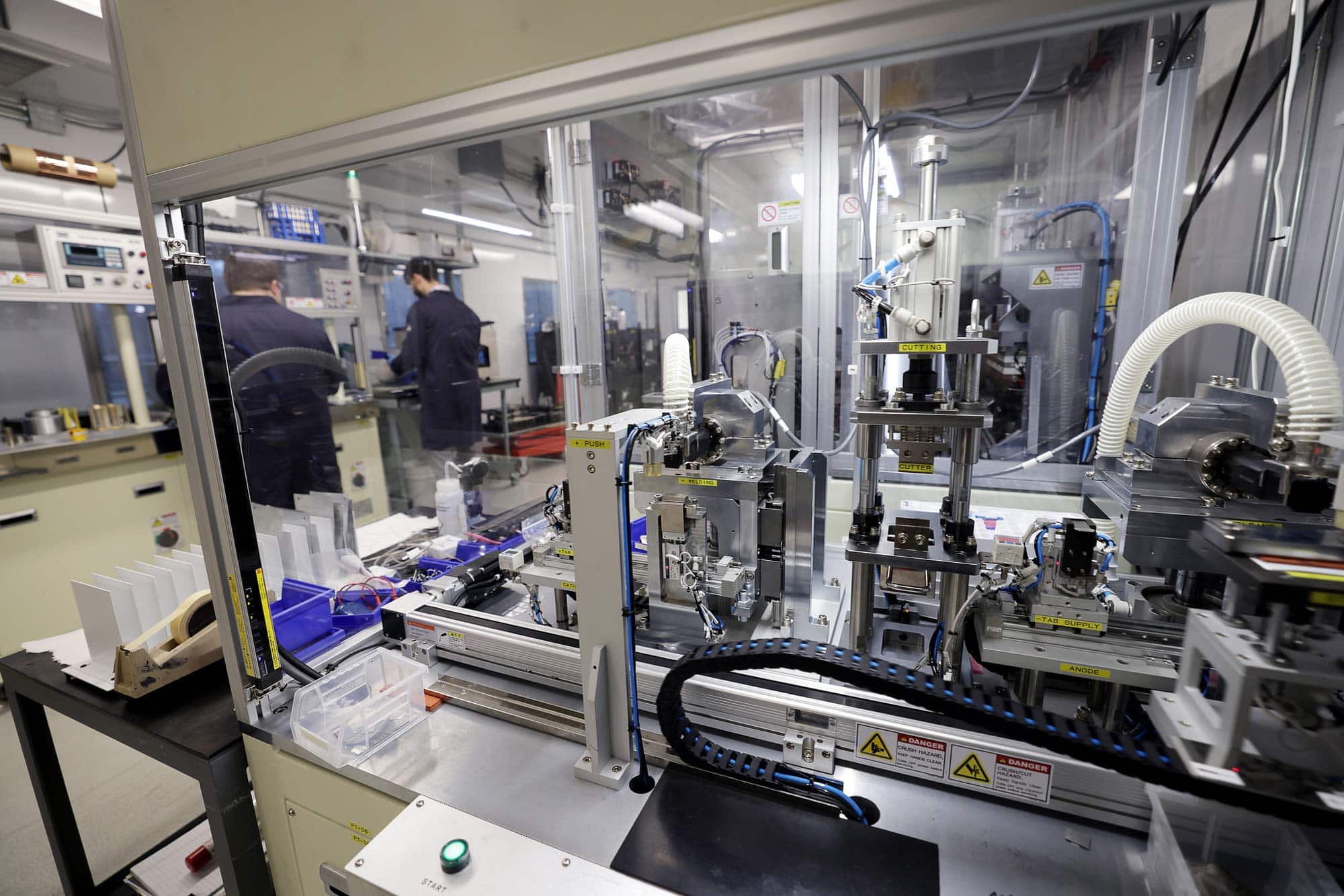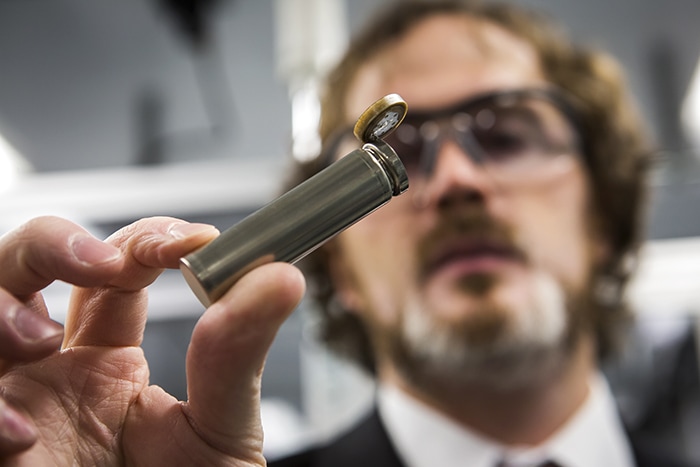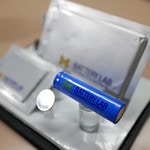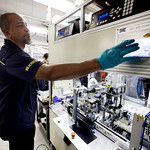ELECTRIC VEHICLE CENTER
Electric vehicles can move us to a more sustainable and equitable mobility future.
The University of Michigan Electric Vehicle Center brings together researchers, educators and automakers to accelerate the transition to EVs and a cleaner, more affordable transportation system. With a $130 million investment from the state of Michigan, it builds on more than a century of U-M leadership in mobility.
Learn more about the Center

Focus Areas
Education & Workforce
Our programs will target both current and future generations of mobility workers with educational offerings at U-M and other institutions across the state.
Technology & Innovation
We support research and development of innovative technology through public-private partnerships. The center is working with industry to develop a technology roadmap.
Expanded U-M Facilities
Plans are underway for a training and R&D facility with an expanded, upgraded Battery Lab that will support both hands-on education and research into next-gen technologies.

U-M Battery Lab
Established in 2015 as the nation’s first university-based pilot line, the U-M Battery Lab is a full-service battery cell fabrication and testing facility open to any academic or industry user. It is being expanded through the EV Center.



About
The University of Michigan EV Center was funded in 2022 with a $130 million investment from the state of Michigan. Housed in the College of Engineering, it is charged with cultivating a robust EV ecosystem in the place where the modern auto industry was born.
The Center launched in 2023 with three focus areas: accelerating collaborative technology R&D, developing a highly skilled workforce, and establishing expanded U-M facilities to support both research and education. Plans for an EV Center facility on North Campus are underway and will go before the U-M Board of Regents for consideration.
Globally, the EV revolution is well underway. Yet there’s an immense amount of work to do in order to meet—and then push beyond—the U.S. goal that half of new car sales be electric by 2030. The EV Center builds on more than a century of U-M leadership in transportation to advance the technology and train the talent we need to lead the transition to a more sustainable mobility future.
People

Alan Taub, Director
EV Center Director Alan Taub is a longtime auto industry executive and Robert H. Lurie Professor of Engineering in Materials Science and Mechanical Engineering at U-M. Taub earned a PhD in Applied Physics from Harvard University.

Christophe Mangin, Managing Director
Experienced executive from GM and Ford focusing on global strategy and corporate alliances, EV Center Managing Director Christophe Mangin earned his PhD from MIT in materials science and engineering economics also served as Program Manager for Business Development for U-M’s Global CO2 Initiative and Managing Director for the Michigan Materials Research Institute.

Greg Less, Battery Lab Director
Greg Less is the Director at the U-M Battery Lab, responsible for the day-to-day operations of the facility. Greg received a doctorate in Chemistry from the University of Michigan. Prior to founding the Battery Lab, he was a research scientist at the University of Michigan and with battery companies T/J Technologies and A123 Systems

Jason Siegel, Director of Education
Leading the center’s education efforts, Jason Siegel is also an Associate Research Scientist in Mechanical Engineering. His research focuses on battery modeling, diagnostic algorithms using battery expansion measurements, and controls.

Ashlee Breitner, Workforce Director
Ashlee Breitner brings more than 15 years of experience in leadership, organizational development and project management to her roles as our Workforce Director. She also serves as managing director at U-M’s Economic Growth Institute and a lecturer for Michigan Engineering’s Center for Entrepreneurship.

Janelle Arbuckle-Michael, Project Manager
With over a decade of expertise in economic development and the establishment of workforce development programs, Janelle Arbuckle-Michael serves as Project Manager at the EV Center. In this role, she actively contributes to shaping a comprehensive workforce development strategy.

Jamie Racklyeft, Communication Lead
With more than three decades of experience in strategic organizational communication, Jamie Racklyeft serves as Communication Lead for the EV Center.

Shelly Christian-Sherman, Business Administrator
Shelly Christian-Sherman serves as Business Administrator for the EV Center and Battery Lab. She earned her Bachelor of Business Administration from Cleary University and has a 30+ year career at U-M.

Ellen Kampf, Senior Administrative Assistant
Ellen Kampf provides administrative support for Alan Taub and the EV Center. Ellen has a master’s in Human Resources Management from MSU.
News & Events
Car Country Plugs In
Michigan Engineer | 11/14/23
The Midwest holds the greatest automotive workforce the world has ever known. With help from U-M’s new EV Center, it’s gearing up to power an electric future.
Power Breakfast: Accelerating EV Deployment in Michigan
Crain’s Detroit Business | 9/27/23
EVC Director Alan Taub served on a panel discussion at Crain’s Power Breakfast on EV deployment.
The Future of EV Batteries
Nova| 8/30/23
Today a team of researchers at the University of Michigan are trying to eliminate EV battery problems by building a solid state battery, which is about half the size of a lithium ion battery, has a much higher energy capacity, and addresses range anxiety and safety issues. Video features an interview with Professor Jeff Sakamoto.
How Easy is an EV Road Trip
UrAvgConsumer, YouTube influencer | 7/6/23
Not sure if an electric vehicle can handle a road trip? Not only is it totally possible, but we also saw how tech-forward Michigan is in the mobility space. Video features an autonomous bus ride to Mcity and footage of the U-M Battery Lab and U-M student teams Solar Car, MRacing and the Electric Motorcycle.
Engineering Sustainable Solutions: Future of EVs
The Circuit News | 6/8/23
A video program by the National Academy of Engineering features an interview with U-M EV Center Director Alan Taub.
University of Michigan launching Electric Vehicle Center as state ramps up EV production
WXYZ | 5/1/23
The University of Michigan is launching an Electric Vehicle Center with help from the state. The center is a part of the state’s effort to ramp up electric vehicle production and cultivate a robust EV ecosystem. Video features a tour of the U-M Battery Lab.
U-M Rolls Out Plan for $130M EV Training and Development Center
Crain’s Detroit Business | 4/27/23
The University of Michigan plans to use a $130 million state appropriation to train workers, develop next-generation electric vehicle batteries and pilot technology alongside automakers, suppliers and startups.
Research
An estimated $50 million of the $130 million in state funding will be dedicated to supporting research and development of innovative technology through public-private partnerships.
The center is working with industry to identify priorities, develop a technology roadmap and implement a collaborative research model.
It will draw on and deepen U-M’s strengths in areas such as mobility, batteries, materials, manufacturing, and life cycle analysis.
Once research directions are solidified, the Center will initiate research and development projects.
Education
With an estimated $20 million of the state investment, the center will target both current and future generations of mobility workers with educational offerings at U-M and other institutions across the state, aiming to eventually engage more than 1,200 students a year throughout its network.
The center is developing a coordinated strategy to support all phases of Michigan’s current and long-term EV talent network needs. Staff are working in partnership with EV workforce development efforts across the state, including the EV Jobs Academy, Talent Action Team and MICHAuto.
These talent needs require education ranging from pre-apprentice, apprentice, associate and bachelor’s degrees all the way to Ph.Ds. They also call for reskilling and upskilling programs such as short courses, certificates and in-house training.
An early focus will be on battery engineering and battery manufacturing, given the industry’s urgent needs and U-M’s existing expertise. Today, U-M offers more than 20 undergraduate and master’s-level courses on battery materials, manufacturing and management, EV electrical components and grid power systems.
New Battery Technology Master’s
By fall 2024, U-M will launch a professional master’s degree in Mechanical Engineering with a specialization in battery technology, covering topics such as manufacturing, pack assembly and battery management systems.
Community College Partnerships
The center will continue to offer Train-the-Trainers Battery Bootcamps for community college instructors, emphasizing a hands-on experience with battery cell and pack technologies.
Facilities
The Battery Lab at the University of Michigan is a full-service battery cell fabrication and testing facility open to any academic or industry user. It was established in 2015 as the nation’s first university-based pilot line, and today it’s the only one located in the heart of the auto industry.
The lab is an IP-protected safe zone where researchers from around the globe can prototype, test, scale-up, and analyze batteries and the materials that go into them. Its 9,000 sq. feet of research space includes a pilot line for pouch and cylindrical cells, an R&D pouch cell line, coin cell fabrication, electrochemical cycling, abuse testing, and a full suite of material characterization tools. A highly-trained technical staff offers guidance during use and instrument training.
Initial Battery Lab Expansion
In 2024, the initial wave of expansion will be an 8,000 sq. foot off-campus facility with:
- A fully dry (-40°C dew point) pilot line capable of creating hundreds of cells per week in either the 21700 cylindrical, or a bipolar tabbed 101x150mm pouch format.
- Fully automated laser welding for battery modules and packs with the industry-leading Manz BLS-500 laser system.